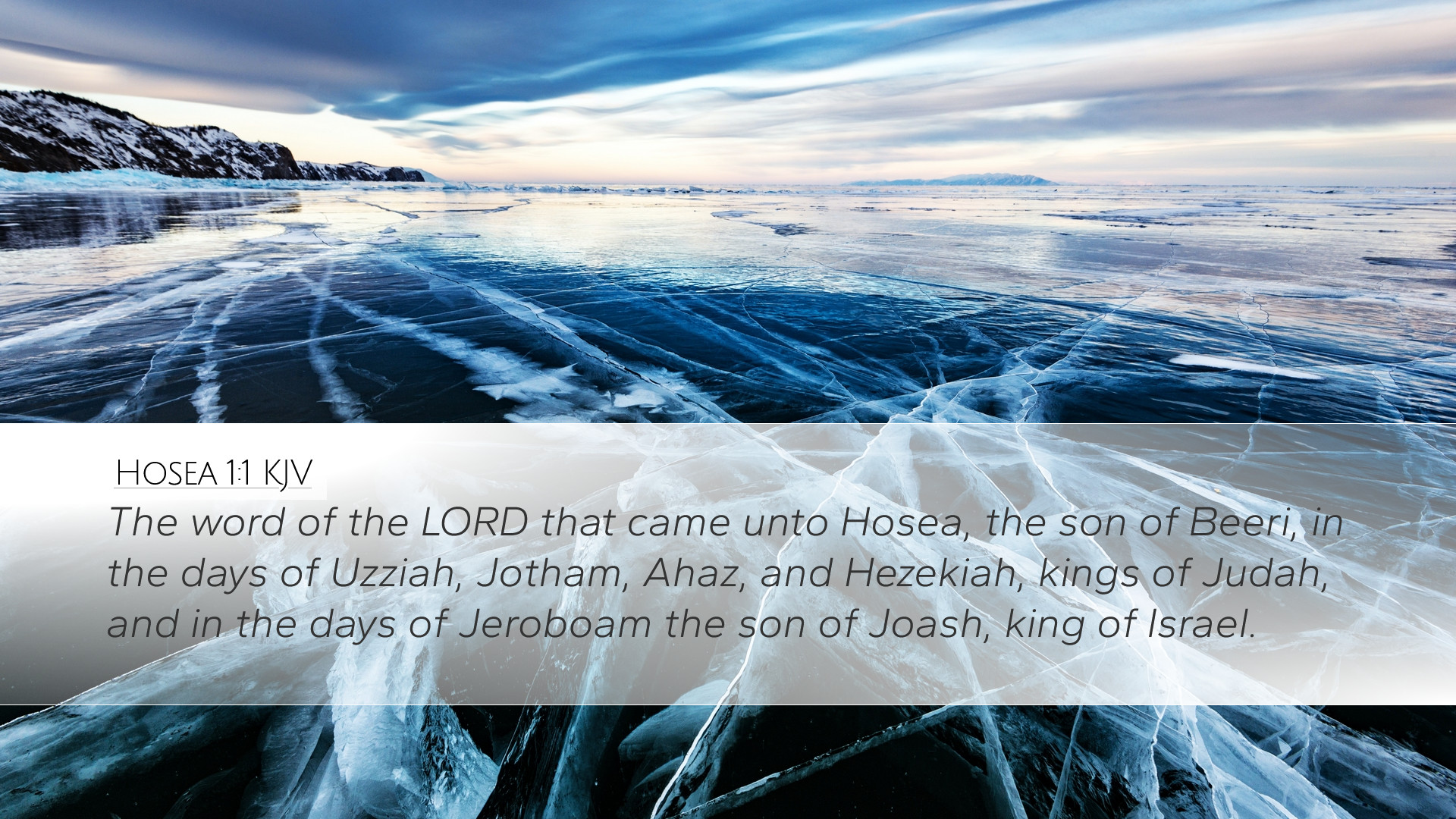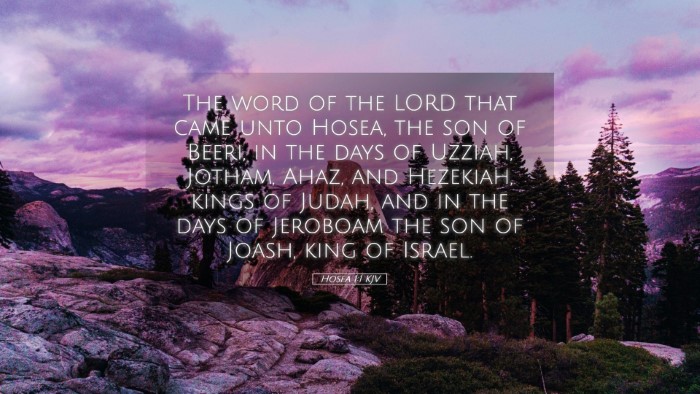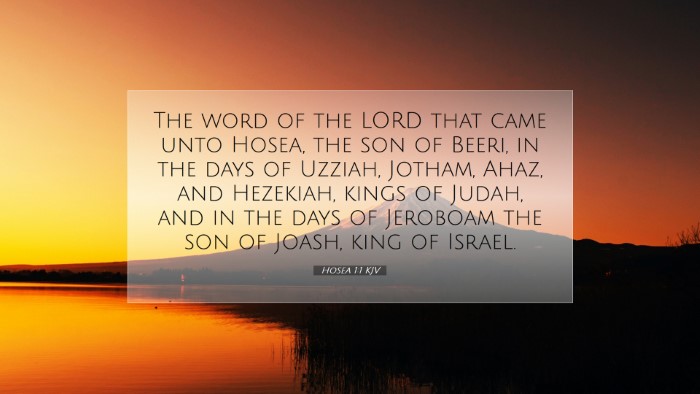Old Testament
Genesis Exodus Leviticus Numbers Deuteronomy Joshua Judges Ruth 1 Samuel 2 Samuel 1 Kings 2 Kings 1 Chronicles 2 Chronicles Ezra Nehemiah Esther Job Psalms Proverbs Ecclesiastes Song of Solomon Isaiah Jeremiah Lamentations Ezekiel Daniel Hosea Joel Amos Obadiah Jonah Micah Nahum Habakkuk Zephaniah Haggai Zechariah MalachiHosea 1:1
Hosea 1:1 KJV
The word of the LORD that came unto Hosea, the son of Beeri, in the days of Uzziah, Jotham, Ahaz, and Hezekiah, kings of Judah, and in the days of Jeroboam the son of Joash, king of Israel.
Hosea 1:1 Bible Commentary
Bible Commentary on Hosea 1:1
Text of Hosea 1:1: "The word of the Lord that came unto Hosea the son of Beeri, in the days of Uzziah, Jotham, Ahaz, and Hezekiah, kings of Judah, and in the days of Jeroboam the son of Joash, king of Israel."
Introduction
The book of Hosea is a profound prophetic text that opens with a specific historical context. Hosea, whose name means “salvation,” serves as a pivotal figure in Israel’s narrative during the tumultuous period of the 8th century BC. The verse sets the stage for a message that intertwines divine love and judgment, reflecting God's yearning for His unfaithful people.
Historical Context
- Kings Mentioned: The verse mentions four kings of Judah—Uzziah, Jotham, Ahaz, and Hezekiah—and one king of Israel, Jeroboam II. Their reigns span a critical era marked by both political upheaval and moral decline.
- Uzziah (Azariah): His prosperous reign allowed Judah to flourish, yet it culminated in pride and judgment (2 Chronicles 26).
- Jotham: Known for his integrity, he nonetheless faced external threats and internal corruption (2 Kings 15:32-38).
- Ahaz: A king notorious for idolatry and reliance on foreign powers, which led Judah into deeper sinning (2 Kings 16).
- Hezekiah: A transformative leader who turned back to Yahweh, initiating significant reforms during his time (2 Kings 18-20).
- Jeroboam II: His reign is characterized by a brief resurgence in Israel's fortunes, but it was also filled with moral decay and prophetic warnings (2 Kings 14:23-29).
Theological Implications
“The word of the Lord that came unto Hosea” asserts the divine origin of Hosea's message. This emphasizes the authority and sacredness of his prophetic calling, as noted by Matthew Henry, who elaborates that divine messages during this time were crucial for guiding Israel back to faithfulness.
Albert Barnes points out that Hosea’s prophetic ministry is marked by a deep concern for Israel's spiritual state and a reflective love; God's heart is revealed as He seeks reconciliation amidst rebellion.
Structure of the Book
The introduction in Hosea 1:1 not only provides a timeline but also hints at the broader structure of the book:
- Chapters 1-3: Hosea's personal life illustrates Israel’s unfaithfulness through his own marital turmoil.
- Chapters 4-14: The core of the prophetic message, containing judgment and hope; a call to repentance interspersed with expressions of God’s steadfast love.
Symbolism and Metaphor
Hosea’s life and his immediate circumstances serve as metaphors for Israel’s relationship with God. His experiences reflect the theme of covenant love juxtaposed with unfaithfulness. Adam Clarke remarks that Hosea's prophetic ministry employs metaphorical language which highlights the tragic reality of spiritual infidelity.
Lessons for Ministry
Hosea 1:1 brings forth critical insights for pastors and theologians. It challenges leaders to recognize the importance of understanding the historical and covenantal context when interpreting prophetic literature. It reminds ministers of the weight of God’s call and the relevant message of repentance that must resonate in their teaching.
Moreover, the recognition of God’s enduring love in the face of human failure should inspire hope and offer a model for pastoral care, emphasizing that restoration is always possible with sincere repentance and faith.
Conclusion
In summary, Hosea 1:1 encapsulates essential elements surrounding the prophetic ministry of Hosea and his vital historical context. The ongoing relevance of this verse lies in its powerful message of divine love, judgment, and the continual call to faithfulness. Reflecting on this can enrich the understanding of God’s redemptive plan and His longing for a relationship with humanity.


